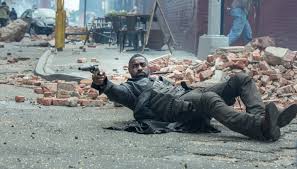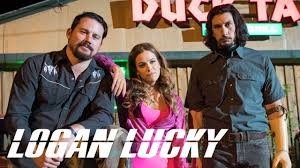 SHORT TAKE: Logan Lucky is Steven Soderburgh’s tongue-in-cheek retelling of his own Ocean’s Eleven franchise as well as an oblique stab at the Hollywood establishment.
SHORT TAKE: Logan Lucky is Steven Soderburgh’s tongue-in-cheek retelling of his own Ocean’s Eleven franchise as well as an oblique stab at the Hollywood establishment.
LONG TAKE: 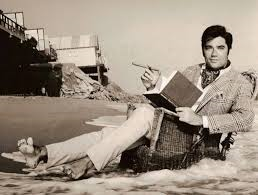 Rex Reed of the New York Film Critics’ Circle hated Logan Lucky and had some very unkind words to say about it. Toe fungus was one phrase he applied, which only goes to prove Logan Lucky WORKS. Nothing against Rex Reed but it’s just that he fell for it. Surprising too as Reed was born in Texas and got his journalism degree from the same LSU that Soderburgh attended. Apparently while Soderburgh embraces his roots, Reed fails to appreciate them. Logan Lucky demonstrates the perils of underestimating someone and – going out on a limb here – might just be an autobiographical parable for Soderburgh’s professional life. For a full explanation you will have to read below in the BIG SPOILERS section.
Rex Reed of the New York Film Critics’ Circle hated Logan Lucky and had some very unkind words to say about it. Toe fungus was one phrase he applied, which only goes to prove Logan Lucky WORKS. Nothing against Rex Reed but it’s just that he fell for it. Surprising too as Reed was born in Texas and got his journalism degree from the same LSU that Soderburgh attended. Apparently while Soderburgh embraces his roots, Reed fails to appreciate them. Logan Lucky demonstrates the perils of underestimating someone and – going out on a limb here – might just be an autobiographical parable for Soderburgh’s professional life. For a full explanation you will have to read below in the BIG SPOILERS section.
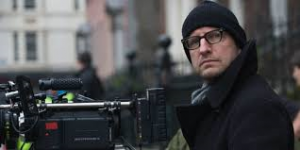 I can’t find another example of a director who made a feature film spoof of one of his own movies. There have been a lot of spoofs – Airplane, Hot Shots, Scary Movie, Naked Gun, and pretty much anything Mel Brooks wrote. But Logan Lucky may be unique.
I can’t find another example of a director who made a feature film spoof of one of his own movies. There have been a lot of spoofs – Airplane, Hot Shots, Scary Movie, Naked Gun, and pretty much anything Mel Brooks wrote. But Logan Lucky may be unique.
SOME SPOILERS
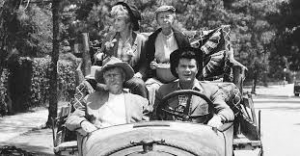 +
+ 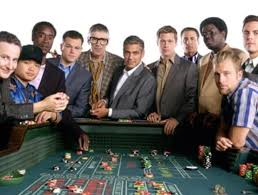 Logan Lucky is basically Beverly Hillbillies meets Ocean’s Eleven. Even the names have the same ambient rhythm to them. Ocean’s Eleven sounds backwards, as though it should be Eleven Oceans, until you realize the intent is to describe the Eleven person team of a man whose last name is Ocean. Logan Lucky is the same way, with the adjective in the back, but without any explanation, except that it is a homage to its predecessor. To be sure we get the connection, Soderburgh has a newscaster comment on the crime: “People are calling it [the heist] Ocean’s Seven-Eleven”.
Logan Lucky is basically Beverly Hillbillies meets Ocean’s Eleven. Even the names have the same ambient rhythm to them. Ocean’s Eleven sounds backwards, as though it should be Eleven Oceans, until you realize the intent is to describe the Eleven person team of a man whose last name is Ocean. Logan Lucky is the same way, with the adjective in the back, but without any explanation, except that it is a homage to its predecessor. To be sure we get the connection, Soderburgh has a newscaster comment on the crime: “People are calling it [the heist] Ocean’s Seven-Eleven”.
Truth be told the Clampett family in the Beverly Hillbillies were often underestimated too. Uncle Jedd had a lot of home spun wisdom which often benefitted the swells in their neighborhood. And the example the Clampetts set of morality, self sufficiency, kindness and generosity was mostly unappreciated but was the backbone of why this show, for all its goofiness, was so popular. They may have been hicks but they had more sense and were happier than all of their neighbors put together.
At first I was not sure if I should be offended by the bald faced home spun backwoods characters Soderburgh conjures. But as time goes on you realize he has a lot more respect for West Virginaians than it might appear. It’s almost as if he is saying it isn’t just the college educated affluent upper class snobs who can plan and execute a clever heist. All it takes is a motive, some common sense and a flair for planning. Let’s put aside for the moment the moral question of our protagonists stealing millions. There is, you’ll find without giving too much away, an aim of poetic justice,  hinted at briefly when recruiting two of the most unlikely techs you’ll ever meet, which tit for tat ending pays off at the end.
hinted at briefly when recruiting two of the most unlikely techs you’ll ever meet, which tit for tat ending pays off at the end.
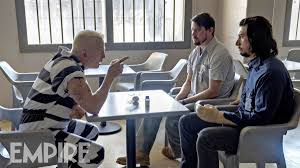 I, personally, approached the movie with great trepidation due to the casting choice of Daniel “James Bond” Craig as a red neck bank robber explosives expert. But, shockingly, my concerns were unfounded as I quickly forgot Craig’s character was anyone other than a tatooed, cocky good ol’ boy with a brilliant knack for getting his job done, and
I, personally, approached the movie with great trepidation due to the casting choice of Daniel “James Bond” Craig as a red neck bank robber explosives expert. But, shockingly, my concerns were unfounded as I quickly forgot Craig’s character was anyone other than a tatooed, cocky good ol’ boy with a brilliant knack for getting his job done, and 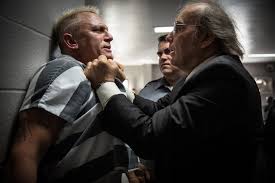 far more self-discipline than you’d give him credit.
far more self-discipline than you’d give him credit. 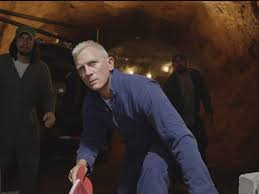 Again someone we, the audience, immediately underestimates on first sight.
Again someone we, the audience, immediately underestimates on first sight.
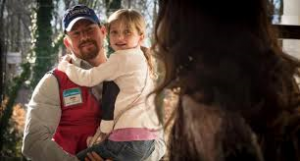 And there’s one scene near the end at a child’s talent show which establishes Soderburgh’s intent to recognize the beauty and dignity of West Virginians despite his teasing and tweaking.
And there’s one scene near the end at a child’s talent show which establishes Soderburgh’s intent to recognize the beauty and dignity of West Virginians despite his teasing and tweaking.
BIG SPOILERS FOR BOTH LOGAN LUCKY AND OCEAN’S ELEVEN
As unlikely as it may seem I believe Logan Lucky is an autobiographic parable of Soderburgh’s professional life.
 The movie starts with Jimmy (Tatum Channing) a hard working schmo amiably divorced and devoted father who runs a bulldozer in an underground construction site beneath the NASCAR race track. The opening scene neatly, with simple dialogue, proves Jimmy is intelligent and capable, a good dad and loves his home state as he chats with his little girl while fixing a car. It is obvious this is a familiar scene as she casually hands him the specific tools he needs like a well trained nurse to a surgeon. They talk about his favorite song – John Denver’s “Take me Home Country Roads”. He does a good job at work but because of a bad knee and the fear of future liability the insurance executives for the construction company insist he be let go.
The movie starts with Jimmy (Tatum Channing) a hard working schmo amiably divorced and devoted father who runs a bulldozer in an underground construction site beneath the NASCAR race track. The opening scene neatly, with simple dialogue, proves Jimmy is intelligent and capable, a good dad and loves his home state as he chats with his little girl while fixing a car. It is obvious this is a familiar scene as she casually hands him the specific tools he needs like a well trained nurse to a surgeon. They talk about his favorite song – John Denver’s “Take me Home Country Roads”. He does a good job at work but because of a bad knee and the fear of future liability the insurance executives for the construction company insist he be let go.
Soderburgh is a Southern boy – born in Atlanta and grew up in Baton Rouge, LA – his stint in Hollywood as an editor was short lived and it wasn’t until his indie films started making money that the industry powers started paying attention. But after a while Soderburgh again left, citing lack of creative and financial control. In short, Soderburgh, much like our protagonist was misjudged, underappreciated, disrespected, underestimated and dismissed.
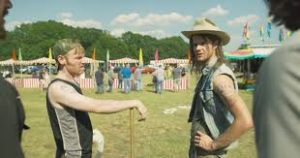 Jimmy acquires two of his team members under the pretext that he is planning this heist on moral grounds. Jimmy is lying, but much like Danny Ocean in Ocean’s Eleven, Jimmy has an ulterior motive he is unwilling to share with them which, in his mind, truly is a just goal. In Ocean’s Eleven Danny’s true end game is getting Tess back by proving to her that her boyfriend, Terry Benedict, doesn’t really love her. In Logan Lucky Jimmy just wants the money he is owed from the work he would have done had the insurance company not unjustly ordered him fired. In both cases there is an ulterior motive known only to the leader.
Jimmy acquires two of his team members under the pretext that he is planning this heist on moral grounds. Jimmy is lying, but much like Danny Ocean in Ocean’s Eleven, Jimmy has an ulterior motive he is unwilling to share with them which, in his mind, truly is a just goal. In Ocean’s Eleven Danny’s true end game is getting Tess back by proving to her that her boyfriend, Terry Benedict, doesn’t really love her. In Logan Lucky Jimmy just wants the money he is owed from the work he would have done had the insurance company not unjustly ordered him fired. In both cases there is an ulterior motive known only to the leader.
In the case of Soderburgh’s life he has reconstructed the anchor in his Ocean’s franchise into what at first glance appears to be a parody which makes fun of both Ocean’s Eleven and Southern “hicks” but in fact does neither. As the movie progresses we come to understand that the people who are labeled as dumb and appear slow have a real genius to their methods. The apparently inane “robbery to-do list” Jimmy makes in planning his heist which includes: “s*** happens, don’t get greedy, walk away,” all come to necessary fruition. 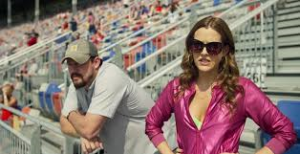 The pretty female of the bunch and Jimmy's sister, Mellie, (Kelley Keoughh) is a hairdresser but knows everything about cars and has the skills of a class A transporter. Joe Bang (Craig) (a – what else – demolition expert) appears to have the IQ of someone who has fallen on their head one too many times. But he explains how bleach and gummy bears with heat will produce the explosion they need, using an improvised chalkboard on which he draws balanced chemical equations.
The pretty female of the bunch and Jimmy's sister, Mellie, (Kelley Keoughh) is a hairdresser but knows everything about cars and has the skills of a class A transporter. Joe Bang (Craig) (a – what else – demolition expert) appears to have the IQ of someone who has fallen on their head one too many times. But he explains how bleach and gummy bears with heat will produce the explosion they need, using an improvised chalkboard on which he draws balanced chemical equations.
The characters read like a Cohen Brothers movie. 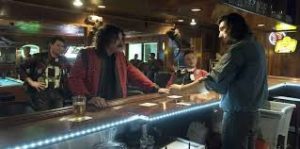 For example Clyde Logan (Adam "Kylo Ren" Driver), Jimmy’s Iraq veteran brother, is called one armed by an obnoxious patron at the bar in which he tends. In response Clyde proceeds to describe with specificity that he is one handed and partially forearmed in a dry deadpan – just before Jimmy beats the tar out of the offending customer.
For example Clyde Logan (Adam "Kylo Ren" Driver), Jimmy’s Iraq veteran brother, is called one armed by an obnoxious patron at the bar in which he tends. In response Clyde proceeds to describe with specificity that he is one handed and partially forearmed in a dry deadpan – just before Jimmy beats the tar out of the offending customer.  When Clyde sees his brother’s “robbery to-do list” he points out that he is not a criminal but that since Jimmy cooked his bacon almost burnt just the way he likes it AND it is obvious by the list that his brother is trying to exercise a certain amount of organizational skills, he will hear him out. This is pure Cohen, director brothers who also create characters often far deeper than they initially seem.
When Clyde sees his brother’s “robbery to-do list” he points out that he is not a criminal but that since Jimmy cooked his bacon almost burnt just the way he likes it AND it is obvious by the list that his brother is trying to exercise a certain amount of organizational skills, he will hear him out. This is pure Cohen, director brothers who also create characters often far deeper than they initially seem.
Like Ocean’s Eleven it appears as though the money has been destroyed or lost but when reviewed later from an alternate POV we find out what ACTUALLY happened. (Clyde: Are we going to trust our lives to them? Jimmy: We only tell them what they need to know.)
And finally the only ones to get hurt are those who are the “real” bad guys. In the case of Ocean’s it is Benedict, the casino owner. In Logan Lucky it is the insurance company. We find out that Jimmy returned “all” the money stolen in a truck deliberately abandoned by him. However, due to the high volume of the concession income during the race and some subterfuge on Jimmy’s part, there was an accounting opportunity for the race track owners to get a substantial amount of “lost” money from —- the insurance company. Unbeknowst to the rest of the team Jimmy squirreled a separate pile away to be hidden until the FBI agents, who he knew would inevitably be all over this case, gave up on them as suspects. What his other, less trusted teammates didn't know wouldn't hurt any of them. As he explained to Clyde he knew they were all free when the FBI no longer paid for his phone which they were tapping. And it was only after he knew they were in the clear that he distributed the shares of the hidden funds. Ultimately the one who was robbed was the insurance company who stole Jimmy’s job in the first place, starting the chain of events for this movie. And everyone who aids Jimmy in his quest gets a piece of the loot – whether they knew they were helping or no. 

A TRUE Robin Hood story – not stealing from the rich to give to the poor but RETURNING money stolen from the poor by the original thief.
In the end the Southern hicks who everyone wrote off use their “ability” to be underestimated like a super power – flying so low under the radar that no one can believe they did it. And the losers are those who tried to exploit them. Soderburgh finds his last laugh in the popularity of his movies despite the lack of support from the Hollywood crowd. Like Jimmy, he is a Southern boy who plucks the prizes from the reach of the establishment swells whose view is obscured by the very nose down which they look.

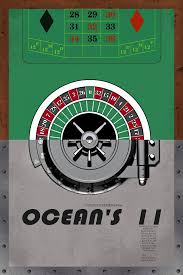 Almost as if Rex Reed wanted to hand me proof that he didn’t “get” the movie because he has BECOME one of the Hollywood establishment, Reed specifically points out that he didn’t think the title Logan Lucky made sense. He never saw the deliberate grammatical connection (what looks like an adjective coming after a noun) or the literary syntax rhythm to the title of its predecessor. It’s a joke Mr. Reed doesn’t get because he has boxed himself up inside the institutional Hollywood structure.
Almost as if Rex Reed wanted to hand me proof that he didn’t “get” the movie because he has BECOME one of the Hollywood establishment, Reed specifically points out that he didn’t think the title Logan Lucky made sense. He never saw the deliberate grammatical connection (what looks like an adjective coming after a noun) or the literary syntax rhythm to the title of its predecessor. It’s a joke Mr. Reed doesn’t get because he has boxed himself up inside the institutional Hollywood structure.
If you like Soderburgh you’ll like this movie. If you liked Ocean’s Eleven you’ll like this movie.
But Logan Lucky is pretty good all by itself.
And it just goes to show you – it isn’t wise to underestimate us Southern folk.
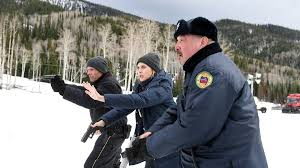
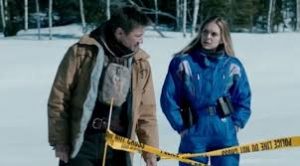
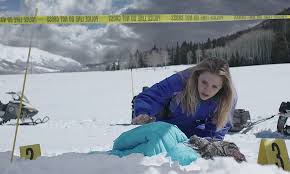 Wind River is, at its core, a murder mystery. A young woman is found barefoot, abused, and frozen to death six miles from anywhere in the Wind River Indian Territory of Wyoming where the night time temperatures get down to negative 20 even in the spring.
Wind River is, at its core, a murder mystery. A young woman is found barefoot, abused, and frozen to death six miles from anywhere in the Wind River Indian Territory of Wyoming where the night time temperatures get down to negative 20 even in the spring.  Her body is discovered by Cory Lambert (Renner) hunter/track of predators for the US Wildlife and Fisheries, and, tragically, family friend of the dead girl. His wordless measured response to finding her body is heartbreaking.
Her body is discovered by Cory Lambert (Renner) hunter/track of predators for the US Wildlife and Fisheries, and, tragically, family friend of the dead girl. His wordless measured response to finding her body is heartbreaking.
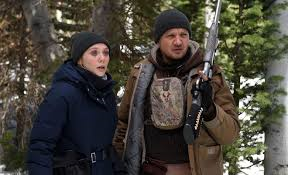
 As you might imagine, there is a LOT going on for this beleaguered protagonist and Renner captures his quiet stoic pain, conveys devoted familial connections, humbly accepts the unearned guilt for the past tragedy, asserts a noble masculinity, and communicates an unflagging determination ALL with a paucity of words.
As you might imagine, there is a LOT going on for this beleaguered protagonist and Renner captures his quiet stoic pain, conveys devoted familial connections, humbly accepts the unearned guilt for the past tragedy, asserts a noble masculinity, and communicates an unflagging determination ALL with a paucity of words. 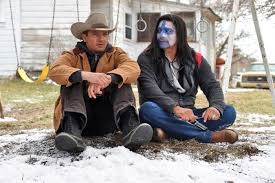 His is an old school acting style the likes of which were seen in Jimmy Stewart’s George Bailey in It’s a Wonderful Life or Gary Cooper’s Sargent York – good, principled men,
His is an old school acting style the likes of which were seen in Jimmy Stewart’s George Bailey in It’s a Wonderful Life or Gary Cooper’s Sargent York – good, principled men,  who act thoughtfully with a steel spine, doing the job others won’t or can’t to protect the innocent as best they can, and try to bring justice into a difficult, sometimes heartless world.
who act thoughtfully with a steel spine, doing the job others won’t or can’t to protect the innocent as best they can, and try to bring justice into a difficult, sometimes heartless world.
 The movie is also beautifully filmed. Utah subs for Wyoming and the vast expanses, open wilderness and sense of brutal but gorgeously frozen mountains is cinematically eye catching.
The movie is also beautifully filmed. Utah subs for Wyoming and the vast expanses, open wilderness and sense of brutal but gorgeously frozen mountains is cinematically eye catching.
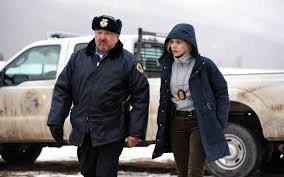 including the iconic Graham Greene as the Tribal Police Officer, are personable and work comfortably with Renner’s character as though, in fact, they have worked together for decades.
including the iconic Graham Greene as the Tribal Police Officer, are personable and work comfortably with Renner’s character as though, in fact, they have worked together for decades.
 There is an artlessly edited flashback which is so unnecessary, sappy, gratuitous and slow it not only interrupts the suspension of disbelief but makes you wonder if, like a bad TV connection, you have been flipped to a different channel. Worst of all it not only contributes nothing to the plot but actually takes away from the flow, the mood, and the suspense. The director could have literally pulled out the entire scene in one unwanted whole, like a splinter from your foot, and it would have been completely unmissed. Its poor inclusion is especially damning as the rest of the movie is pretty darned good.
There is an artlessly edited flashback which is so unnecessary, sappy, gratuitous and slow it not only interrupts the suspension of disbelief but makes you wonder if, like a bad TV connection, you have been flipped to a different channel. Worst of all it not only contributes nothing to the plot but actually takes away from the flow, the mood, and the suspense. The director could have literally pulled out the entire scene in one unwanted whole, like a splinter from your foot, and it would have been completely unmissed. Its poor inclusion is especially damning as the rest of the movie is pretty darned good.

 This is a visually impressive but moody, grim film. If it were not for the jarringly bright, snowy, stunningly beautiful shots of mountain vistas one might even call it a film noir.
This is a visually impressive but moody, grim film. If it were not for the jarringly bright, snowy, stunningly beautiful shots of mountain vistas one might even call it a film noir. 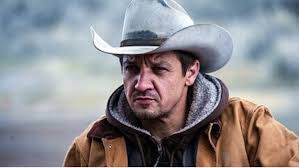 The center of this film is the character studies and the axis about which everyone turns is the amazing character Renner crafts as Lambert.
The center of this film is the character studies and the axis about which everyone turns is the amazing character Renner crafts as Lambert.

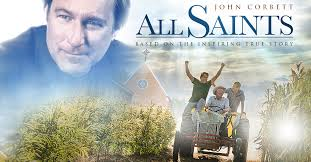
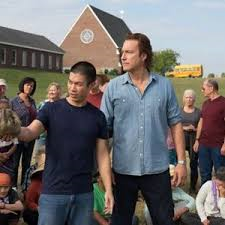

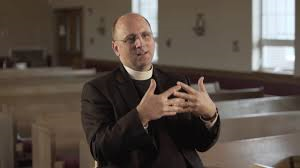
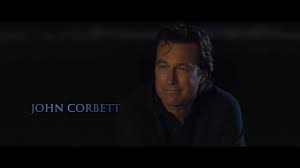
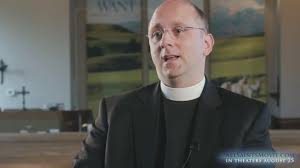
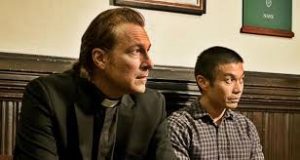
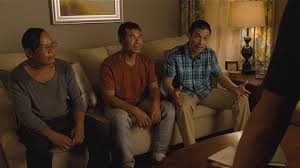
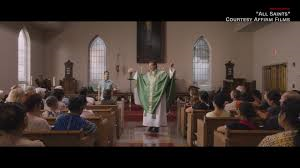
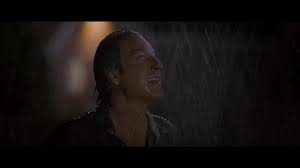

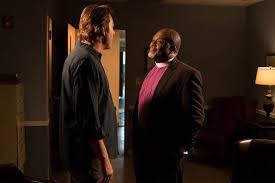
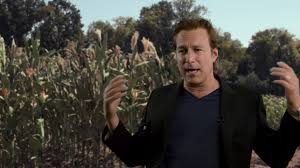
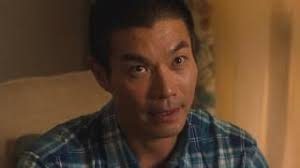

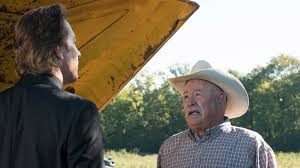
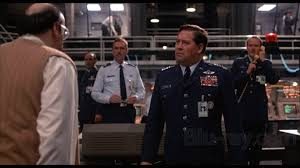 BTW – Appropos of nothing except my own fond memory of the scene – Corbin, as General Beringer, says one of my all time favorite lines, which I have applied every time I have been frustratingly faced with one of those forced upgrades we must all endure from either our business programs or Microsoft: “Mr. McKittrick, after very careful consideration, sir, I've come to the conclusion that your new defense system sucks.” LOLOL
BTW – Appropos of nothing except my own fond memory of the scene – Corbin, as General Beringer, says one of my all time favorite lines, which I have applied every time I have been frustratingly faced with one of those forced upgrades we must all endure from either our business programs or Microsoft: “Mr. McKittrick, after very careful consideration, sir, I've come to the conclusion that your new defense system sucks.” LOLOL
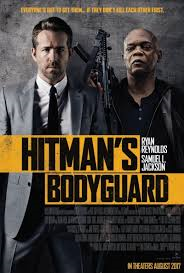


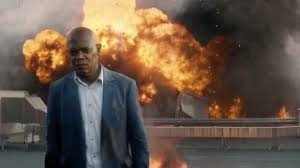
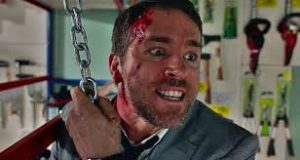
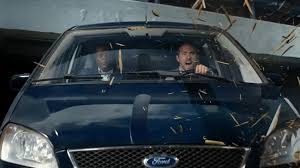
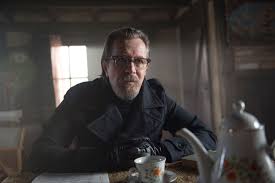


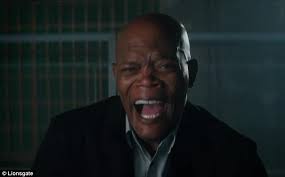

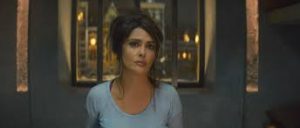
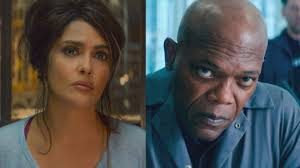

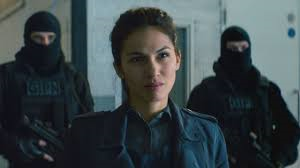

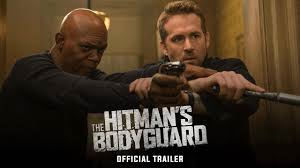
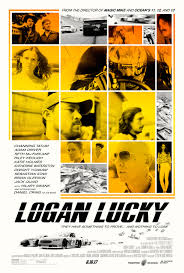



 +
+















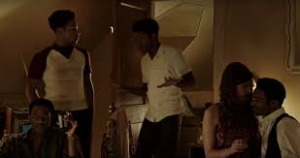
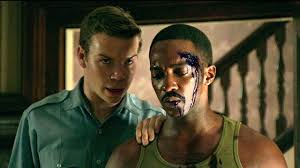
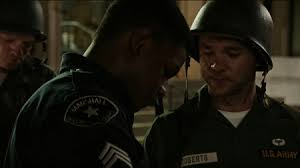
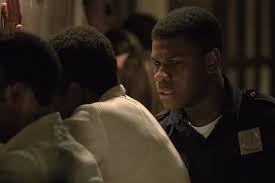

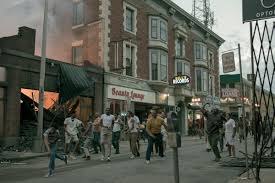

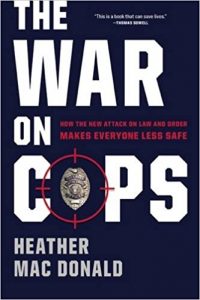
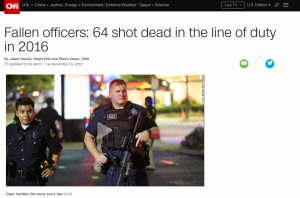
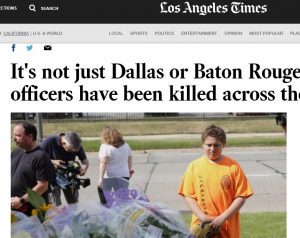
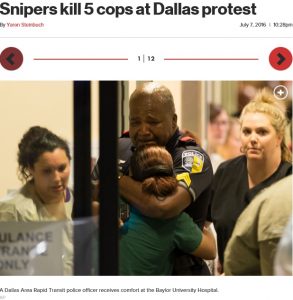
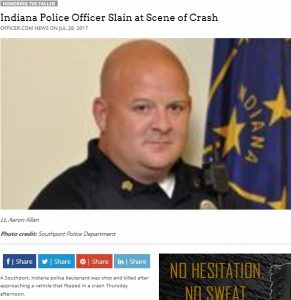
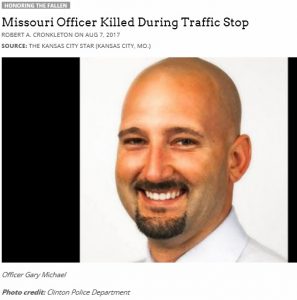

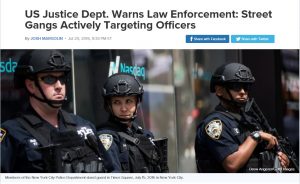
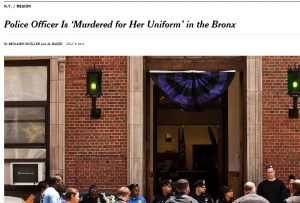

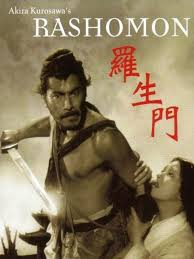

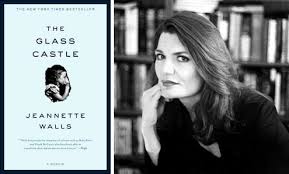
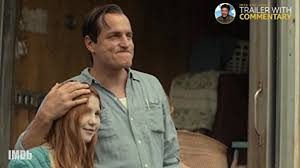
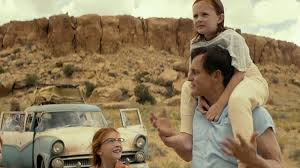

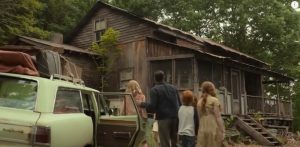
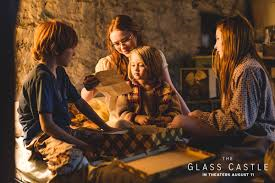

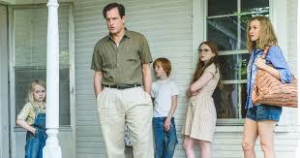
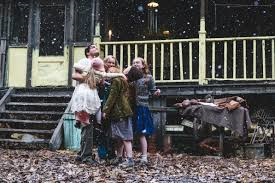

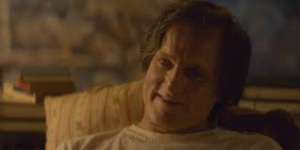



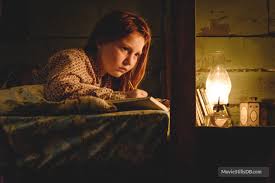
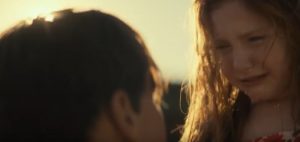

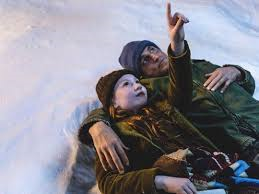
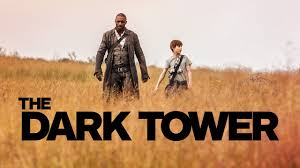 Popular wisdom says that origin books are almost always better than the movies based on them. While often true the reverse is more prevalent than you might think.
Popular wisdom says that origin books are almost always better than the movies based on them. While often true the reverse is more prevalent than you might think. 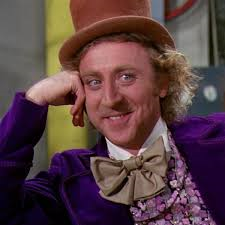 Take Gene Wilder’s Willie Wonka and The Chocolate Factory. The movie, based on the book Charlie and the Chocolate Factory, did not wander far from the source material. Though since Dahl wrote both the book and the first draft of the screenplay that is not surprising. But the movie had an added fillip which, to me, was the most memorable moment in the story. Charlie had snuck a sip of Fizzy Lifting Drink and Wonka tells Charlie because of that he won’t get any reward. But it’s a test.
Take Gene Wilder’s Willie Wonka and The Chocolate Factory. The movie, based on the book Charlie and the Chocolate Factory, did not wander far from the source material. Though since Dahl wrote both the book and the first draft of the screenplay that is not surprising. But the movie had an added fillip which, to me, was the most memorable moment in the story. Charlie had snuck a sip of Fizzy Lifting Drink and Wonka tells Charlie because of that he won’t get any reward. But it’s a test. 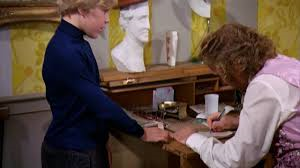 Despite Wonka’s cruel and angry behavior to him Charlie gives Wonka back the gobstopper souvenir instead of selling it to Wonka’s competitor. Wonka says: "So shines a good deed in a weary world," then tells Charlie he is to inherit the entire factory. It’s a beautiful moment masterfully played out between Wilder and Ostrum. But it wasn’t in the book. To me it was the crown jewel of the adventure.
Despite Wonka’s cruel and angry behavior to him Charlie gives Wonka back the gobstopper souvenir instead of selling it to Wonka’s competitor. Wonka says: "So shines a good deed in a weary world," then tells Charlie he is to inherit the entire factory. It’s a beautiful moment masterfully played out between Wilder and Ostrum. But it wasn’t in the book. To me it was the crown jewel of the adventure.
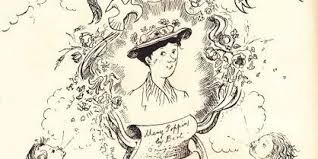 Mary Poppins was a series of adventures with the title character coming and going into and out of the Banks' children's lives, as the winds changed: trips around the world, tea parties on the ceiling, learning to cook when the Banks’ cook goes on leave, the birth of other children in the Banks' household, etc – some knit into the movie, most not. But no where does it have the central theme of rescuing not the children, but ultimately the Banks’ children’s father, despite the fact, according to the movie
Mary Poppins was a series of adventures with the title character coming and going into and out of the Banks' children's lives, as the winds changed: trips around the world, tea parties on the ceiling, learning to cook when the Banks’ cook goes on leave, the birth of other children in the Banks' household, etc – some knit into the movie, most not. But no where does it have the central theme of rescuing not the children, but ultimately the Banks’ children’s father, despite the fact, according to the movie 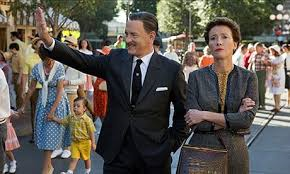 Saving Mr. Banks, this was the intent of her stories. Apparently she was just too coy with the theme. The movie, however, makes this beautiful theme crystal clear.
Saving Mr. Banks, this was the intent of her stories. Apparently she was just too coy with the theme. The movie, however, makes this beautiful theme crystal clear. 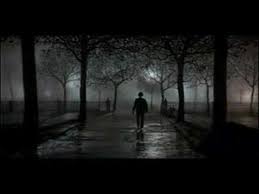 The hair on the back of your neck will stand up and the hardest will get teary watching a defeated Mr. Banks, knowing he is about to be fired, believing he has failed his children, stand, in the dark at the bottom of the steps of St Paul’s Cathedral where the children had wanted to buy feed for the birds. As the instrumental version of Feed the Birds swells in the background and you know there is a change of wind coming for HIM, you know you are experiencing one of the great moments of cinema. This was not nor could have been adequately portrayed in the book.
The hair on the back of your neck will stand up and the hardest will get teary watching a defeated Mr. Banks, knowing he is about to be fired, believing he has failed his children, stand, in the dark at the bottom of the steps of St Paul’s Cathedral where the children had wanted to buy feed for the birds. As the instrumental version of Feed the Birds swells in the background and you know there is a change of wind coming for HIM, you know you are experiencing one of the great moments of cinema. This was not nor could have been adequately portrayed in the book.
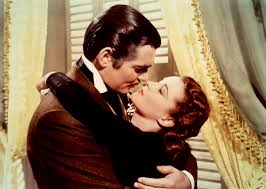 Gone With the Wind, while a classic book did not capture the imagination the way the movie did with its sweeping panoramas of Tara in her glory and stricken Confederate soldiers at the railroad station or the burning of Atlanta all against Max Steiner’s magnificent soundtrack and the incendiary chemistry between Leigh and Gable as Scarlett and Rhett played out in Technicolor.
Gone With the Wind, while a classic book did not capture the imagination the way the movie did with its sweeping panoramas of Tara in her glory and stricken Confederate soldiers at the railroad station or the burning of Atlanta all against Max Steiner’s magnificent soundtrack and the incendiary chemistry between Leigh and Gable as Scarlett and Rhett played out in Technicolor.
 Harry Potter series, which are based on a sequence of books so packed with rich magical ideas and creativity that even in 8 movies the filmmakers could only make a Reader’s Digest version. Short shrift was given to some characters like
Harry Potter series, which are based on a sequence of books so packed with rich magical ideas and creativity that even in 8 movies the filmmakers could only make a Reader’s Digest version. Short shrift was given to some characters like 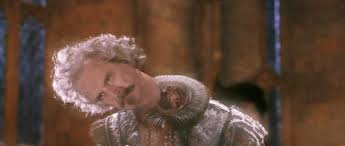 Nearly Headless Nick and some were left out altogether
Nearly Headless Nick and some were left out altogether 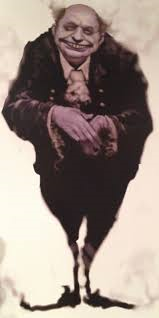 like Peeves; and some brilliant parts of the books were sadly absent from the films: Harry dressing down Lupin for virtually abandoning his wife and child; the previously misjudged Fleur Delacour declaring her continued devotion to the now scarred Bill Weasley saying "I am beautiful enough for the both of us." It was obvious the movies were a labor of love but just couldn’t do the books justice.
like Peeves; and some brilliant parts of the books were sadly absent from the films: Harry dressing down Lupin for virtually abandoning his wife and child; the previously misjudged Fleur Delacour declaring her continued devotion to the now scarred Bill Weasley saying "I am beautiful enough for the both of us." It was obvious the movies were a labor of love but just couldn’t do the books justice.
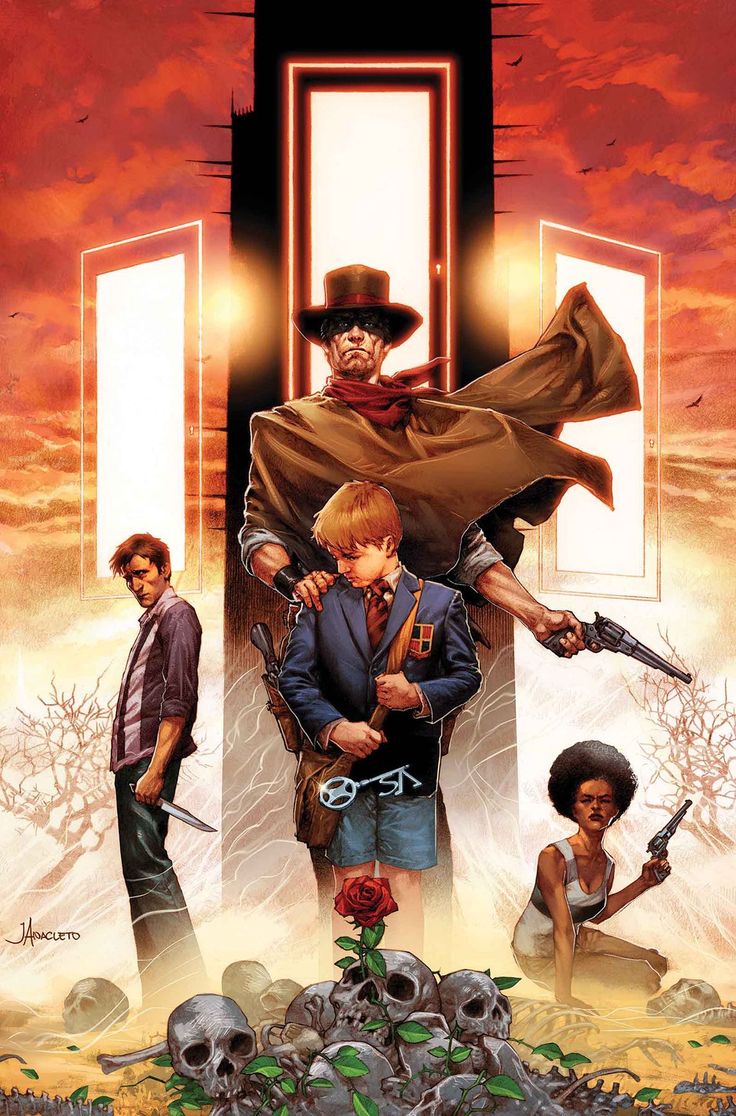 Then there’s Dark Tower. *weary sigh* I once was a fan of Stephen King. That was before he went on a diatribe against the pro-life movement, but that’s a story for another blog. During the height of my King fan-reading I tried to slog through the series of Dark Tower books AS they were coming out. I couldn’t get past the third of what would eventually be eight. It was an incomprehensible mess. It seemed as though King would wake up every morning and before his first cup of coffee spill, without filter, whatever thoughts came to him. Then the next day he would do the same thing, making weak efforts to tie what he’d written the previous day into the current days "work". There were lobster monsters and vampires, slow mutants and doomed theme parks, fatal rides on mining cars and homages to his other books. And in the book ROLAND, THE GUNSLINGER THOUGHTLESSLY MURDERS JAKE just to be able to continue his quest towards this Dark Man who, as time goes on, seems to not be quite as bad as the the Gunslinger himself. Then at the end of the 8th book (I read the Wikipedia synopsis recently as I didn’t want to wade through the rest of the books) King pretty much gives a middle finger to his audience, leaving the Gunslinger to start his quest all over again with no real resolution. The series reads like a challenge to see just how devoted his fans really are – like an insecure child constantly misbehaving just to be forgiven, demanding his parents prove they love him.
Then there’s Dark Tower. *weary sigh* I once was a fan of Stephen King. That was before he went on a diatribe against the pro-life movement, but that’s a story for another blog. During the height of my King fan-reading I tried to slog through the series of Dark Tower books AS they were coming out. I couldn’t get past the third of what would eventually be eight. It was an incomprehensible mess. It seemed as though King would wake up every morning and before his first cup of coffee spill, without filter, whatever thoughts came to him. Then the next day he would do the same thing, making weak efforts to tie what he’d written the previous day into the current days "work". There were lobster monsters and vampires, slow mutants and doomed theme parks, fatal rides on mining cars and homages to his other books. And in the book ROLAND, THE GUNSLINGER THOUGHTLESSLY MURDERS JAKE just to be able to continue his quest towards this Dark Man who, as time goes on, seems to not be quite as bad as the the Gunslinger himself. Then at the end of the 8th book (I read the Wikipedia synopsis recently as I didn’t want to wade through the rest of the books) King pretty much gives a middle finger to his audience, leaving the Gunslinger to start his quest all over again with no real resolution. The series reads like a challenge to see just how devoted his fans really are – like an insecure child constantly misbehaving just to be forgiven, demanding his parents prove they love him.
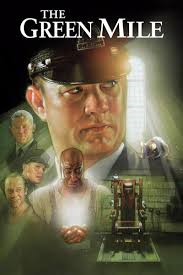 Green Mile was a beautifully written modern parable and I’d be hard pressed to say which I liked better – book or movie. They were both well done, the former by King the latter by Frank Darabont.
Green Mile was a beautifully written modern parable and I’d be hard pressed to say which I liked better – book or movie. They were both well done, the former by King the latter by Frank Darabont.
 So they took the general idea of the Dark Tower quest, the 3 main characters – Roland, Jake and Walter the Dark Man, SOME of the weirdness
So they took the general idea of the Dark Tower quest, the 3 main characters – Roland, Jake and Walter the Dark Man, SOME of the weirdness  (animal mutants wearing people faces) and created a STORY.
(animal mutants wearing people faces) and created a STORY. 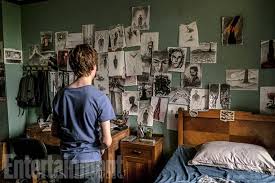 Fatherless Jake and his widowed then remarried mother live in a New York beset with signs of coming cataclysm – earthquakes and eerie storms. His visions of the gunslinger’s Wasteland – a world which has "moved on" – and his violent outbursts drive his desperate mother to seek help from psychiatrists who ultimately schedule him for a stay at a retreat for troubled youths. When Jake realizes the social workers who have come to take him are mutants from the Wasteland of his visions he escapes through a portal in an abandoned house possessed by a demon sent by the Dark Man….and THIS is the version of the story that makes SENSE!
Fatherless Jake and his widowed then remarried mother live in a New York beset with signs of coming cataclysm – earthquakes and eerie storms. His visions of the gunslinger’s Wasteland – a world which has "moved on" – and his violent outbursts drive his desperate mother to seek help from psychiatrists who ultimately schedule him for a stay at a retreat for troubled youths. When Jake realizes the social workers who have come to take him are mutants from the Wasteland of his visions he escapes through a portal in an abandoned house possessed by a demon sent by the Dark Man….and THIS is the version of the story that makes SENSE!
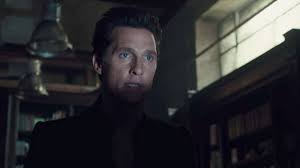 The Dark Man, Walter, is played like a sinister Vegas magician by Matthew "Interstellar" McConaughey. Not his fault – just the way it’s written. McConaughey does his best to tread that fine line between over the top scene chewing bad guy and seductive Hannibal Lector-like serial killer. The result is serviceable but nothing to write home about.
The Dark Man, Walter, is played like a sinister Vegas magician by Matthew "Interstellar" McConaughey. Not his fault – just the way it’s written. McConaughey does his best to tread that fine line between over the top scene chewing bad guy and seductive Hannibal Lector-like serial killer. The result is serviceable but nothing to write home about.
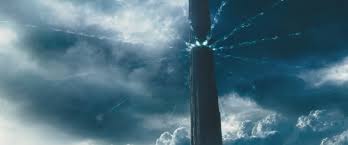 If the Dark Tower is the force for good, why is it DARK? The thing looks pretty darned creepy as portrayed – not some bastion of good and cohesive force. Traditionally, especially in a mythos-like fable of good and evil something this DARK would represent evil. And why is something DARK under attack from the DARK Man? The name similarities are either a product of a direct intentional relationship or sloppy writing. If the former there is a glaring inconsistency. As this is a completely invented universe we have no context for making a distinction and are given no explanation. Where did the mutants come from and why does the Dark Man make them wear masks? Why do the "mutants" look like large versions of Ratty from Wind in the Willows? How did the Wasteland come to "move on" and where did that expression come from? Not to be pedantic or facitious but where did it move to? Just an odd phrase for something falling apart. How does the Gunslinger have the power to resist the Dark Man’s magic and if the Dark man has the power to put people under his control just by waving at them why does he play with Roland like a sated cat with a mouse instead of just sending people by the thousands to overwhelm him?
If the Dark Tower is the force for good, why is it DARK? The thing looks pretty darned creepy as portrayed – not some bastion of good and cohesive force. Traditionally, especially in a mythos-like fable of good and evil something this DARK would represent evil. And why is something DARK under attack from the DARK Man? The name similarities are either a product of a direct intentional relationship or sloppy writing. If the former there is a glaring inconsistency. As this is a completely invented universe we have no context for making a distinction and are given no explanation. Where did the mutants come from and why does the Dark Man make them wear masks? Why do the "mutants" look like large versions of Ratty from Wind in the Willows? How did the Wasteland come to "move on" and where did that expression come from? Not to be pedantic or facitious but where did it move to? Just an odd phrase for something falling apart. How does the Gunslinger have the power to resist the Dark Man’s magic and if the Dark man has the power to put people under his control just by waving at them why does he play with Roland like a sated cat with a mouse instead of just sending people by the thousands to overwhelm him?
